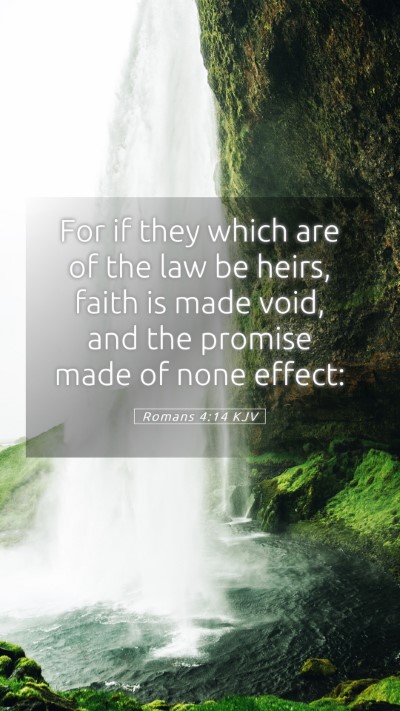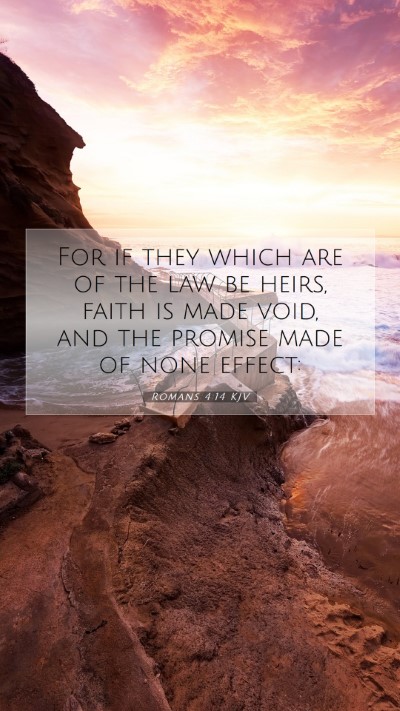Old Testament
Genesis Exodus Leviticus Numbers Deuteronomy Joshua Judges Ruth 1 Samuel 2 Samuel 1 Kings 2 Kings 1 Chronicles 2 Chronicles Ezra Nehemiah Esther Job Psalms Proverbs Ecclesiastes Song of Solomon Isaiah Jeremiah Lamentations Ezekiel Daniel Hosea Joel Amos Obadiah Jonah Micah Nahum Habakkuk Zephaniah Haggai Zechariah MalachiRomans 4:14 Meaning
What is the meaning of Romans 4:14?
For if they which are of the law be heirs, faith is made void, and the promise made of none effect:
Romans 4:14 Bible Verse Meaning
Understanding Romans 4:14 - A Comprehensive Bible Verse Commentary
Romans 4:14 states: "For if they which are of the law be heirs, faith is made void, and the promise made of none effect." This verse plays a pivotal role in the Apostle Paul's discussion of faith, grace, and the nature of the law in relation to salvation.
In this commentary, we will explore the meaning of this Bible verse through insights drawn from notable public domain scholars such as Matthew Henry, Albert Barnes, and Adam Clarke. Our goal is to provide a thorough understanding of this scripture, facilitating deeper Bible study and comprehension for individuals and groups alike.
Contextual Analysis
To fully appreciate Romans 4:14, it is essential to understand its context within Paul's epistle to the Romans. In the preceding verses, Paul argues that righteousness is attained through faith, highlighting the example of Abraham, who believed God and was counted as righteous before any law was given.
Matthew Henry's Commentary
- Faith vs. Law: Henry emphasizes that relying solely on the law for salvation contradicts the essence of faith. If the heirs of God depend on adherence to the law, then faith loses its significance, as the promise hinges entirely on faith and not on works.
- Nature of the Promise: He notes that the promise of God to justify believers through faith remains unaffected by the law, which highlights the unchanging nature of God's covenant with those who believe.
Albert Barnes' Exegesis
- The Irrevocable Promise: Barnes states that God's promise is not nullified by human incapacity to fulfill the law. Instead, the promise operates independently of whether one can keep the law, facilitating hope to all who believe.
- The Role of Faith: He further argues that if the promise were based on the law, then it would lead to despair, as no one is capable of fulfilling the law perfectly. Thus, faith stands as the sole means through which the promise is realized.
Adam Clarke's Insights
- Heirs of God: Clarke explains that being heirs doesn't depend on the works of the law but on the faith that Abraham exhibited. He illustrates how this faith leads to righteousness being accounted to those who believe.
- Faith Makes the Promise Valid: Clarke strongly asserts that the validity of God's promise lies in faith, which establishes a relationship based on trust rather than legalistic observance.
Broader Implications of Romans 4:14
From the interpretations and insights gathered, Romans 4:14 serves as a powerful reminder of the transformative nature of faith in the life of believers. It speaks against the futility of relying on human efforts to earn God's grace. Instead, it champions the idea that faith is the key to accessing the promises of God.
Application of the Verse
- For Personal Reflection: This verse challenges individuals to examine their reliance on the law versus faith in their spiritual lives.
- In Group Study: Romans 4:14 provides a rich topic for Bible study groups discussing the nature of grace and faith, fostering deeper discussions about their implications in daily life.
Cross References
- Galatians 2:21: Highlights the principle that salvation cannot come through the law, reinforcing Paul's argument about faith and grace.
- Romans 3:28: Paul states that we conclude that a man is justified by faith without the deeds of the law, paralleling the message in Romans 4:14.
- Hebrews 11:6: Emphasizes that without faith it is impossible to please God, tying back to the necessity of faith in the believer's relationship with God.
Conclusion
In conclusion, Romans 4:14 encapsulates a vital theological truth about the relationship between faith and the law. Scholars such as Matthew Henry, Albert Barnes, and Adam Clarke provide insights that enhance understanding and application of this scripture. Engaging with these interpretations will illuminate the path to deeper Bible study insights, enriching both personal faith and communal exploration of biblical truths.


